#Greta Thunberg: A Year to Change the World
Explore tagged Tumblr posts
Note
You put in your Astro observations post that Pluto in Aquarius is going to go crazy for Aquarius placements for the next 20 years. I have Aquarius Mars, Uranus, Jupiter, and MC. Am I doomed? 😭



Gurrllll, look, as an astrologer my job is to be extremely cautious with the things I say, so I'm going to answer you the following: yes and no. When Pluto starts to move "freely" through Aquarius, it will activate your Mars, Uranus, Jupiter and Midheaven. I can already tell you that there are big changes coming to your life, if you already work then maybe you will reconsider your career somewhere in the future. Just as you can gain recognition through what you do (Midheaven, Mars). Pay attention to the degrees in which your planets are, depending on the degree you have, you may only feel these large and intense movements when Pluto is 5 degrees forward and backward from where the degrees of your planets are.
Now I'll give you an example ( ͡° ͜ʖ ͡°):
Pluto in Capricorn affected a lot, a huge lot, people who have important placements in Capricorn, these people went through gigantic changes, gained power, lost power, got married, had children, lost things, gained a lot of money.
Greta Thunberg, for example, has her Sun in Capricorn (12 degrees), Pluto went there and passed right over her Sun, making her awaken to structural problems that society ignores. It was by seeing and understanding a series of drastic problems that she used her personal power to bring social awareness to a large number of people and Pluto gave this power to her, giving her strength to face what needs to be faced.
Kylie Jenner, ascendant in Capricorn, Neptune in Capricorn in the 1st house, Kylie underwent gigantic transformations in her 1st house, the ascendant, literally changing the shape of her body through surgeries and aesthetic procedures. Not only that, she needed to mature, go through transformations that required a lot of her, but that also gave her the power she has today. Pluto shone on Kylie Jenner and she, with 8th house energy, knew how to use it.
Pitbull, another Capricorn, he literally gained international fame, Pluto made him gain power over the masses, and elevated him to another world, gave him the chance to put his person and his music in the world in a huge way, his fame was gigantic, during 2008-2014 he was at his peak. Pluto gives power, he takes the person who is fighting to win something and he sees how the person wants something so much, so badly, that he gives the person the opportunity to win what they truly desire.
Timothée Chalamet, had Pluto transit over his 5th house, activating all his stellium in Capricorn, calling him to leave his mark on the world, to be someone of prominence, who stands out for being who he is, creating a renown, a legacy.
Zayn Malik, another example, the singer had his 11th house extremely activated, house of Aquarius, house of the great masses of people. Not only did he become extremely famous doing what he wanted, but he also drastically changed his life, opposite his 5th house, he started a family, had his first child, for example.
See how cool Pluto can be too? With the definitive entry of Pluto into Aquarius, Aquarius themes and people will gain much, much more relevance. There are dramatic things coming too, but that's a topic for another conversation. If you want to know more book a reading with me, I'll be happy to be of your assistance. ദ്ദി(˵ •̀ ᴗ - ˵ ) ✧(´。• ◡ •。`) ♡



#astrology#astro community#astro notes#astrology notes#astro observations#astrology observations#astroblr#astrology placements#astro posts#zodiacsigns#zodiac#horoscope#aries#taurus#gemini#cancer#leo#virgo#libra#scorpio#sagittarius#capricorn#aquarius#pisces#sun in aquarius#pluto in aquarius#pluto in scorpio#pluto in astrology#pluto in capricorn#pluto in sagittarius
101 notes
·
View notes
Text
so, 2025 doesn't seem like the year for our environment. but what can you, as an individual, and we, as a group, do in the face of denial?
please like, reblog, and share.
as donald trump takes office in 2025, he brings with him his ignorance of climate change. the government in the usa will now do nothing to reduce their carbon emissions, and whether you're republican or democratic or not even american, this event will affect you and the generations to come.
so... how can we make a difference?
as individuals, this seems like too big a problem to tackle. but we, the people, can make the biggest change. women's voting and gay rights did not start when governments started listening to what people were saying. they started when people took to the streets in protest, demanding better policies, better laws, better futures. if we work together, we can make a difference.
some steps you can take to reduce your carbon emissions:
eat locally grown/produced food. this encourages sustainable practises of farming, reduces the need for fuel-based transportation, and generates less pollution.
eat less meat, particularly lamb and beef. livestock generally produces a large amount of methane, which is a particularly harmful greenhouse gas. in especially more intensive farms, crops and trees are often cut down to make way for the large amounts of land that we need to raise animals.
take public transport, or even walk to places. this reduces your carbon emissions by miles, and often is a reason for you to improve your physical health. this is also much more economically sustainable for you, with fuel prices rising as companies make record profits drilling into our home.
these individual solutions are not only doable, but also cost effective. this is very much your world, and we, the future generation, can do all we can to reduce the harmful legacy we're inheriting.
if you and a group of people, families or friends or whole communities, are passionate about what is happening to our earth, here's some things that require a group effort:
try to get your family talking about other, renewable sources of energy for your home, or better insulation. conserving energy and generating it from endless sources are a fantastic way to reduce your carbon footprint and take action against climate change. and once you do it, convince others to do the same.
volunteer at cleanups. live in a littered area? see rubbish at the beach? organise something with family or friends to help clean it up! working as a group will increase morale and ultimately get the job done, and the next time you look at that place, you'll feel a sense of satisfaction as a reward. you may even make it a open event, and meet new people who have the same beliefs as you along the way.
recycle, reuse, and give. this seems obvious, but over-consumption is almost trendy today, as fast fashion takes the stage to triumph more sustainable ways of clothing. swap clothes with your friends, donate old clothes to charity, even buy secondhand, but all of these things are pre-loved and extremely helpful for the environment. additionally, using things until they can't be used anymore is an underrated yet effective (and cost effective!) way of doing nothing while doing a lot.
it's not too late, not for america, and not for the rest of the world. there are people all over the globe showing others how to be kinder to our earth, and when the people in charge won't, we will. it's time to make 2025 the year of change. it's time to start fighting for our futures and uniting under a common cause. what affects the poor today will affect the rich tomorrow, and you will feel the impact of rising sea levels and deforestation and global warming in no time. this is no 'old arguement'. this is an international emergency. we will not be dismissed; we will not do nothing.
in the words of greta thunberg, change is coming, whether you like it or not.
#climate change#2025#global warming#america#world#climate action#activism#climate crisis#climate catastrophe#climate justice#climate activism
25 notes
·
View notes
Text
Excerpt from this story from Grist:
In 2015, when the countries of the world hammered out the Paris Agreement, they committed to limiting global temperatures to 2 degrees Celsius above preindustrial levels and “pursuing efforts” toward keeping them below 1.5 degrees C. The plan didn’t work out so well. Ten years later, the planet might have crossed that lower threshold sooner than expected.
A pair of new studies in the journal Nature Climate Change looked at historical data and came to the conclusion that the record heat last year — the first year to surpass 1.5 degrees C — wasn’t a temporary fluke, but a sign that the world is now soaring past this influential climate target over the long term. The new year continued that upward trajectory. Even as a natural cooling pattern called La Niña took hold recently, January managed to be hotter than ever, clocking in at a record 1.75 degrees C warmer than the preindustrial average.
One analysis of the two studies warned that Earth had entered a “frightening new phase.” It’s a reflection of the language that has been used around 1.5 C ever since the Intergovernmental Panel on Climate Change, the United Nations-backed team of leading climate experts, wrote an influential report in 2018 on the consequences of exceeding that threshold, which it estimated would happen in 2030. Headlines warned that the world had 12 years to avert climate catastrophe. The line was echoed by the young Swedish activist Greta Thunberg and Representative Alexandria Ocasio-Cortez from New York. So is the world now at the edge of disaster?
Mike Hulme, a professor of human geography at the University of Cambridge, asserts that it isn’t. “There’s no ‘cliff edge’ that emerges from any of the scientific analyses that have been done about these thresholds,” he said. “They are, in many senses, just arbitrary numbers plucked because they are either integers or half of an integer.”
Hulme, who has been studying the way people think about climate change for decades, argues that an obsession with global temperatures misunderstands why people care about climate change in the first place: They care about how it affects their lives, not abstract readings of the thermometer. He’s also argued that climate advocates should stop chasing a series of “deadlines” to try to drum up enthusiasm for meeting these goals.
Grist spoke with Hulme to learn more about how setting these deadlines can backfire and if there’s a better way to talk about how to make progress on climate change. This interview has been condensed and edited for clarity.
Q.You’ve written that the 1.5 C goal “painted the world into a dangerous corner.” What exactly was dangerous about it?
A.The danger of this goal is that it was always impossible to achieve — or 99 percent impossible to achieve — 10 years ago. And everybody, I think, who understands both the dynamics of the physical climate system, and also the dynamics of the world energy system, understood that — 1.5 became a campaigning number around which civic groups, activists, and youth entrepreneurs mobilized: “1.5 to stay alive.” It was interpreted as being if 1.5 was breached, then the world either moved into an entirely different physical state that was dangerous compared to 1.4 — or, and this came along later, that somehow 1.5 represents a “tipping point” in the Earth system, which if exceeded, triggers certain feedback mechanisms that cannot be undone.
Either way, it cultivates an atmosphere of fear. And the danger is, if we’ve transgressed 1.5, the feeling mounts that somehow it’s game over, that we’ve failed in our task to manage the risks of climate change. And that, to some at least, will cultivate cynicism, disillusion, and a loss of focus. These are dangerous emotions. They don’t help with clear-eyed thinking around the difficult politics of climate and energy.
18 notes
·
View notes
Text
Life in the Provinces
I was passing through a Norwegian public transport station recently, and saw this ad on the screens:

Roughly translated: "His first 100 days threaten 100 years of advancement in children's rights. Donate by Vipps [payment app] 100 to 2230."
"Redd Barna" on the end literally translates as "Save the Children" but it's also the proper name of a Norwegian charity org. On their website is a bit more description.
Da den amerikanske presidenten tiltrådte, stanset han all amerikansk bistand – en beslutning som over natten frarøvet barn over hele verden livsviktig mat, medisiner og beskyttelse. Hans første 100 dager truer 100 års fremgang for barns rettigheter. Nå trenger barn over hele verden at du blir med å kjempe. Bistandskutt og bistandsfrys har satt barns liv i fare. Uten nødhjelp og bistand står millioner av barn overfor en usikker fremtid. Vi i Redd Barna nekter å la dette skje, og vil fortsette å kjempe for at alle barn skal overleve, lære og være trygge.
On one level this is just another begpost with crying children, by a more serious source (still not very serious, Redd Barna was also doing Greta Thunberg nonsense about climate change).
On another level I'm annoyed by the persistent low-level dishonesty and lawyer-speak. It's not enough to simply say that Trump has stopped funding and children are starving, no, Redd Barna feels the need to say there's some "children's rights" that were "advancing" or "developing" thanks to specific recent innovation, and Trump "threatens" these "rights".
On another level I once again get the feeling that Norway is an American province. (Most of the world is American provinces.) Here's a Norwegian organization writing in the Norwegian language inside Norwegian buildings to ask for more money to Pooristan, and it's framed around the American president, because it's so dependent on American money. Redd Barna says it will have to close operations in 40 countries, because of Donald Trump. Redd Barna says it will be unable to serve 8-12 million children, because of Donald Trump. Redd Barna has become an American appendage, which speaks Norwegian for legacy reasons.
Which brings me to another recent bit of Life in the Provinces.

Prime Minister Anthony Albanese has faced calls to respond after the Trump administration cut funding to seven Australian universities. The administration's move came after US agencies asked Australian researchers to justify why they should continue receiving American research grants. The cut of funding could leave a $600 million hole in the efforts of Australian researchers, with the US the largest research partner of Australia.
That's a lot of money. This sort of thing keeps happening. Trump pulls some funding, and a foreign country scrambles to respond because apparently some sector of their industry was living off the American money hose.
Further down the article we have this talking head:
"The federal government must push back on the Trump administration's blatant foreign interference in our independent research in the strongest possible terms," NTEU president Alison Barnes said.
I do not think those words mean what you think they mean. Is this the Curse of Babel?
15 notes
·
View notes
Text
“There’s all different roles that are really important in the climate fight. There’s firefighters, world builders and rule changers,” Schwanz said, describing “firefighters” as people like Greta Thunberg who are bringing attention to the dangers of climate change.
“Solarpunk is a very good example of the world builders.”

In the Bay Area, where a local solarpunk chapter formed this year and ventures like Solar Punk Farms in Sonoma County are working as a functional model for its lifestyle of ecological sustainability. Bay Area Solarpunks founder Bruce Shigeura said this alternative vision for the future is sorely needed for a youth distraught by climate anxiety.
“There are so many young people out there who are disillusioned, who are feeling really down because the U.S. is going to pull out of the Paris Agreement, cut down on renewable energy and ramp up fossil fuels,” Shigeura said. “There are two paths now: Despair or real optimism. Solarpunk is optimistic.”
“(A) major difference between solarpunk and steampunk is that solarpunk ideas, and solarpunk technologies, need not remain imaginary,”
Solar Punk Farms is a realized image of a solarpunk lifestyle that has implemented many of the movement’s ideas, from utilizing regenerative agriculture that considers each layer of a forest as part of the ecology, to partnering with Zero Waste Sonoma to become a community compost site for residents in west Sonoma County. Next year, they hope to invest in a water capture system that can preserve months of water throughout the year.
Ed's Note: What is missing in their solarpunk farms vision is the social and communal aspect of solarpunk. Where's the community?
19 notes
·
View notes
Text
EARTH IS MISSING! / EVERYONE'S WORLD IS ENDING ALL THE TIME
this spring I entered the Elizabeth Soutar Bookbinding Competition held by the National Library of Scotland. The theme this year was climate change. I didn't win any of the categories (I certainly didn't think I'd win any of the Craft categories, but I thought I had a decent shot at the Creative categories) but I am very happy with how my binding came out anyway!
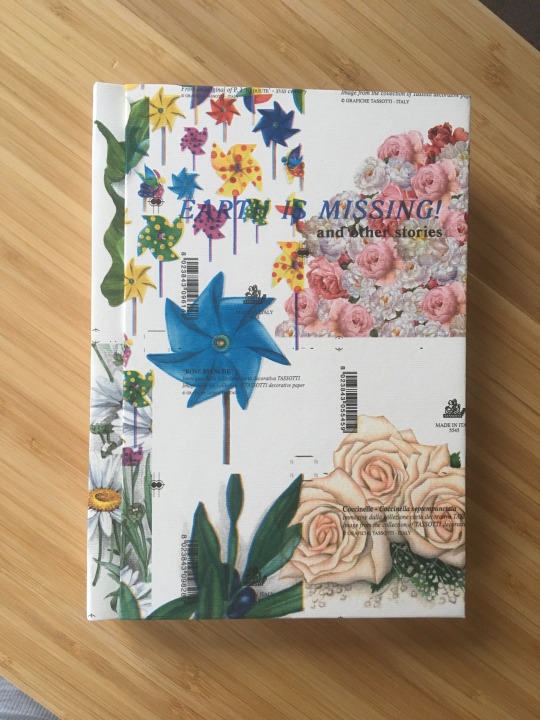



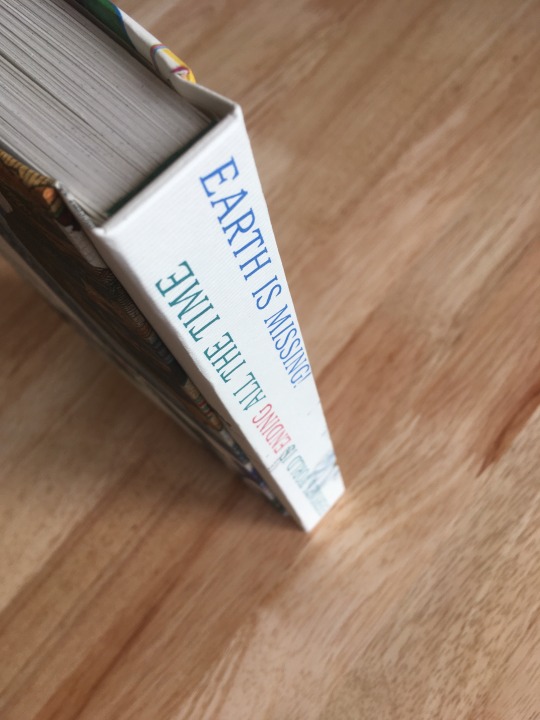

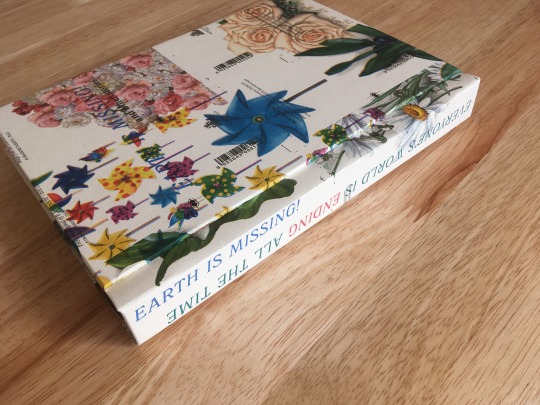

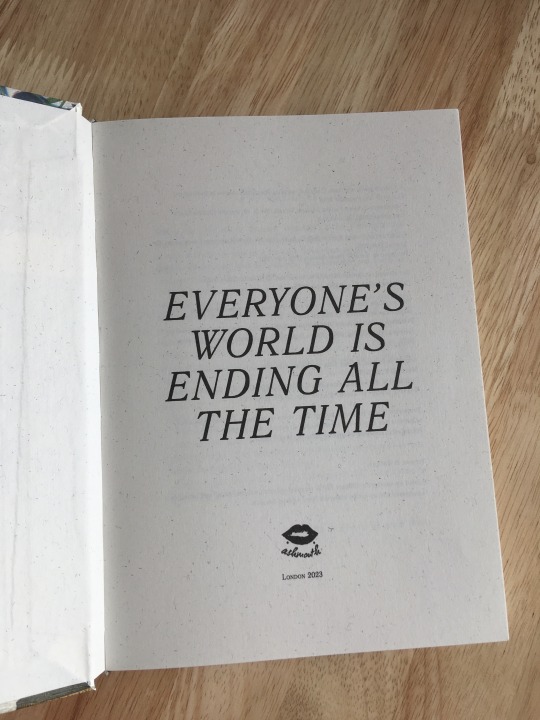



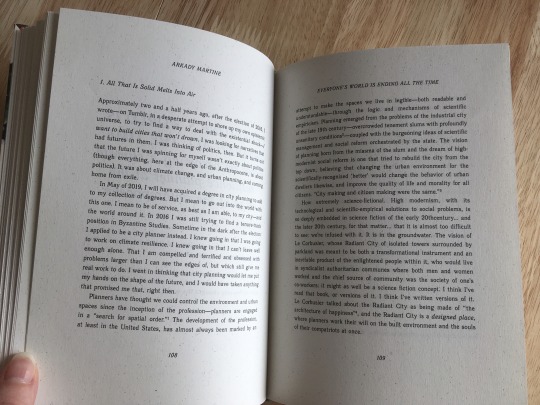
under the cut is the details of the binding and the process that went into it, plus a full list of the texts included.
this is a modified 3 piece bradel binding - a 3 piece bradel is usually made with leather spine with the spine attached to the textblock and the front and back covers added on after. there's another variety of a 3 piece bradel case where the spine and boards are assembled with a thin piece of paper to later be covered with a bookcloth. I wanted to use some leftover misprint cardstock I had (the same stuff I'd previously used to make paperbacks) and I wanted to print the titles directly onto the covers and spine (specifically I wanted to overprint the titles to imitate the existing misprint), and in order to fit it through my printer I had to have it in three pieces. so I assembled a bradel case as if it were to be covered with a cloth, only the cardstock I was using to assemble the case would also be the cover material.
everything I used to make this book was recycled or reused, with the exception of the greybeards which were new (I didn't have any rescued book boards from secondhand books at the time). the text paper is recycled eco-craft paper, the endbands are re-used macramé cords wrapped in green wrapping paper that came from a gift bag, and as mentioned, the cover material comes from a misprinted running sheet.
a few process photos of getting the case together:

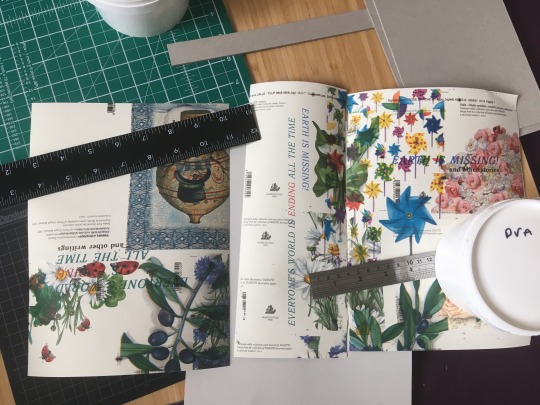






in terms of content, I took care that not only should the binding fit the theme of climate change - by using recycled and reused materials - but the text inside should also fit the theme. there were a lot of considerations there because I could easily have just bought a copy of something like Greta Thunberg's speeches and rebound them, but I wanted the texts to be something that made sense to me. so I went and looked at the SFF magazines I read for climate fiction and essays, I looked for academic papers, and I looked on Gutenberg for older pulp fiction relating to climate change. once I had a selection of texts I pared them down to two categories, fiction and non-fiction, and decided the most fun way to bind them would be as a tête-bêche with fiction on one side and non-fiction on the other, and this then informed how the binding would physically turn out - the modified 3 piece bradel.
here is the full table of contents for each side of the book:
EVERYONE'S WORLD IS ENDING ALL THE TIME and other writings
A Climate of Competition: Climate Change as Political Economy in Speculative Fiction, 1889–1915 by Steve Asselin Published in Science Fiction Studies, Vol. 45, No. 3, SF and the Climate Crisis (November 2018), pp. 440-453
A Century of Science Fiction That Changed How We Think About the Environment by Sherryl Vint Published in the MIT Press Reader, 20th July 2021
The climate is changing. Science fiction is too. by Eliza Levinson Published in The Story, 30th June 2022
’Not to escape the world but to join it’: responding to climate change with imagination not fantasy by Andrew Davison Published in Philosophical Transactions: Mathematical, Physical and Engineering Sciences, Vol. 375, No. 2095, Theme issue: Material demand reduction (13 June 2017), pp. 1-13
Science in Fiction: A Brief Look at Communicating Climate Change through the Novel by Eline D. Tabak Published in RCC Perspectives, No. 4, COMMUNICATING THE CLIMATE: From Knowing Change to Changing Knowledge (2019), pp. 97-104
Everyone’s World Is Ending All the Time: notes on becoming a climate resilience planner at the edge of the anthropocene by Arkady Martine Published in Uncanny Magazine issue 28, May 7, 2019
EARTH IS MISSING! and other stories
Earth Is Missing! by Carl Selwyn in Planet Stories (1947)
Climate—Disordered by Carter Sprague in Startling Stories (1948)
Climate—Incorporated by Wesley Long in Thrilling Wonder Stories (1948)
A Being Together Amongst Strangers by Arkady Martine in Uncanny Magazine (2020)
You’re Not The Only One by Octavia Cade in Clarkesworld Magazine (2022)
Why We Bury Our Dead At Sea by Tehnuka in Reckoning Magazine (2023)
#my binding#bookbinding#Elizabeth Soutar Bookbinding Competition#recycled materials#reused materials#climate fiction#climate action
165 notes
·
View notes
Text
Regarding AI and Climate Change
I know that, generally, most people on this website seem to have an understanding that AI is bad. But, let's expand (with sources at the bottom).
We know that AI steals people's work and uses it and recycles it without ever asking for permission or giving credits.
But, do you know about AI's impact on our planet?
In order to have a 67% chance of Earth's climate returning to the way it was before human intervention, we have five years to completely halt all carbon emissions. Five years. To reduce our carbon emissions to zero. Each year that we fail to reduce our carbon emissions and pollution according to the targets set by the Paris Climate Agreement, we lose more of our carbon budget and give ourselves less time to transition to a sustainable future.
And AI is burning us through energy, water resources, and carbon even faster.
With each search, AI can use anywhere from 30-100 kilowatts of electricity. Millions of gallons of water are required to cool the hardware used for training and running generative AI models, which strains municipal water systems and local ecosystems. Tech companies that have implemented AI, like Microsoft, Google, and Meta, have seen 48-66% in increases in carbon emissions.
And resource usage will only increase as AI is further developed and more widely used.
The outlook is grim. But we have seen throughout history that collective movement of the people does change things. We need to mobilize. Stop using AI. Educate the people around you about the climate crisis and AI's contributions to it.
Our future depends on it.
~
References and further reading:
The Climate Book by Greta Thunberg
Explained: Generative AI’s environmental impact by Adam Zewe
Generative AI’s environmental costs are soaring—and mostly secret by Kate Crawford
AI’s Climate Impact Goes Beyond its Emissions by Jude Coleman
AI Is Pushing the World Toward an Energy Crisis by Ariel Cohen
AI’s Energy Demands Are Out of Control by Reece Rogers
AI’s Insatiable Appetite for Energy by David Gelles
The Obscene Energy Demands of AI by Elizabeth Kolbert
6 notes
·
View notes
Text
"End of era. I can't make retrospective statements. It's why I've been filming this documentary for 12 years. Every single time a statement ends, the idea to follow that with a retrospective statement, something that looks back, something that is celebratory of a previous thing, blargh, it makes me wanna crawl out of my skin, I hate it. I just wanna go forward. This is the only record where I do look back a little bit. I mean, I think the only time I specifically do it is in 'Guys'. 'The moment that we started a band, was the best thing that ever happened'. It's quite sad. It was also one for the homies, you know. I wanted to write a love song for friends. People don't have that very much. I love that idea. And even if it was the fact that going through the DNA of who we were, to make this record, there's so much reference to old emo core, or house music that we were growing up with. It feels like we went right back. We went and found all the old photos, you know, of where we came from, is almost how it felt to make this record. When I made this record, I was like, '[beep], this is the last 1975 record, for ages'. Not the last 1975 record, but this is definitely us stopping making music for a bit. There's essentially been lots of different album out, for this record. We live in a world of, you know, iTunes uploads six months before the record comes out. Someone's like, 'we needed a piece of artwork,' and I keep going, 'Okay, 'I'll give you our piece of artwork'. The artwork changed every week. The artwork now is basically the most minimal version, example, of what we've had, and it's all been based on texture, and the concept of wabi-sabi. The record's been about deconstruction. The record feels like it should be just in a paper bag. I wanted to steal The Durutti Column idea. The Durutti Column, one of my favorite bands of all time, they made one record, the vinyl cover was sandpaper, so it destroyed any record that it was next to. I mean, oh my God, how [beep] badass is that shit? That is so my vibe. I wish that I had of done it, but the thing is I love that idea so much that I couldn't have passed it off as my own. I grew up in punk and hardcore. The most punk person that I have ever met in my life is Greta Thunberg. She gave me a sense of hope, do you know what I mean? We're all kind of wallowing in nihilism, and what's the point? And when you meet her, she don't give you a pat on the back, I'll tell you that much, but she [beep] means what she's talking about. We were talking about the Sega Mega Drive startup sound of The 1975, and we were talking about how that happens every time, and we were like, 'What is the most modern version of that?' And then the conversation became, 'Well, what is the most modern thing? What is the most modern statement?' And it was Greta Thunberg, we realized, we get Greta Thunberg to sing it. 'We are facing a disaster of unspoken sufferings for enormous amounts of people'. That idea was obviously exciting, immediately. Using that platform is a great thing to do, and it's also creatively exciting. The moment she's deemed, she's one of the most important figures of our generation, but I really like the idea of formally encapsulating that in a piece of music that therefore exists in pop culture, in the way that music does, and goes on a record. You know, no one's gonna find a tweet about Greta Thunberg in the rubble, in a thousand years, do you know what I mean? But if in a thousand years they found that record, that would move somebody in a thousand years, who finds that in the rubble."
May 22, 2020: Matty explains The 1975's Notes on a Conditional Form album. (source)
#year: 2020#may 2020#quote: matty healy#topic: album meaning#topic: retrospection#topic: greta thunberg#song: the 1975#song: guys#overlap: eras#album: noacf#era: noacf#era: mfc#source: pitchfork
12 notes
·
View notes
Text
some positive and negative thoughts i have on this last day of pride month:
the positive parts of pride made my heart feel warm. it was so amazing marching with the queers for palestine parade block (greta thunberg was marching with us too!!!). the actual protest part (holding up signs, shouting slogans loudly, showing solidarity) is what i live for. i feel like i’m part of something bigger. i feel like i can truly make a change. my feet hurt and i’m dizzy from the heat but i’ve never felt more powerful. also seeing all the other amazing blocks (dykes on bikes, leather gays, puppies, bears, russian queer immigrants etc etc) made me feel so happy.
but i’m so tired of cis gays during pride (and all year around tbh). i’m so tired of making identities, protests and activism palatable. pride has always been and should be and is still a protest. i don’t really know what the pride parades are like in other countries/cities but here in finland we have the big parade/protest that leads us to a big park where is the “park celebration”. it finally clicked why every year after pride i feel so disappointed/angry/sad. it’s the park celebration that ruins it for me. we have such a big drinking culture here in finland that every chance we get we will drink. the park celebration has just become an excuse for people to come and drink and hang out with friends. and yeahhh ofc this is what we are fighting for!!! for us to celebrate!!! but have you seen the world we are in. of course i would love to celebrate but holy shit i want to fight even more. people even do the whole “i won’t come to the parade but let’s meet up at the park”. I’M SO FUCKING TIRED!!!!!!!! FUCKING DO SOMETHING!!!!!!!!! PUT YOUR DRINKS DOWN AND ACT THE FUCK UP!!!!!! and let me tell you these folks are almost always cis (white) gays. like i said, i’m so tired of cis gays. like i feel like they never get it. they don’t honor pride like pride should be honored (also if you’re gay and cis and you are doing the work this isn’t about you. move along and let me be angry)
on top of this there are these homophobic christians that drive around finland with these big ass homophobic signs. there was a skateboard event on saturday and they absolutely destroyed those signs (hell yeahhhh this is what i want to see). and one of my cis gay friends sent it to me with her basically saying “yeah i’m against them too but violence is never the option”. yeah fuck off. bring back violence at this point. bring back being angry and fighting back. stop being a fucking pussy
anywayyyyy my pride month ended with me sitting on the back of a bus on my way back home and next to me were three other trans people and it made me really happy. i feel like a dog seeing another dog in public everytime i see trans people. it just felt like a good end to this month. we didn’t say anything to each other but it made me feel safe and fuzzy inside (i really wanted to smile at them but i didn’t want to be weird)
#this is just mindless yapping#idk if this makes any sense i just need to vent bc i’m pissed#but being angry is why pride is still a protest so hell yeah
13 notes
·
View notes
Text
A semi-coherent rant on climate change, the value of idealism, and a criticism of TGCF (But also not really because I haven’t finished it yet and also I love MXTX…)

I’m in the middle of Book 3 of Tian Guan Ci Fu, and it is legit making me depressed. Like really, unnecessarily sad. I know I should probably wait until the end to write up my thoughts since I don’t know how things will ultimately turn out, but I feel like I need to process. And so, here we go…
First of all, I am sooo Xie Lian. I feel like this story gets me down so much because it hits too close to home. When I was little, I was super idealistic—I used to go around telling people that love was the most important thing in the world, and that civilization was wrong, because we were destroying the environment, and so we should all go back to living in harmony with nature. I was like a crazy, radical five year old, but also somehow mature-sounding and nauseatingly sweet. Grownups loved me and assumed I would grow up to do something big. But… I haven’t really. Instead I am just a normal person and realized that the world is actually super complicated—like I said, sooo Xie Lian. Except I never became a god or saved even one person…
Anyways, it’s not like I disagree with MXTX’s criticism of blind idealism. She hit the nail on the head—crushingly well. But I guess, like Xie Lian, I am still clinging to that last bit of hope I haven’t let go of yet.
In TGCF and Mo Dao Zu Shi, things are never black and white, and she criticizes those characters who act with a blind sense of righteousness. She believes in nuance. And yet, in our current moment, we are headed toward a climate catastrophe, and it feels like we are all just sitting back, trying to carefully weigh the ideal course of action—the pros and cons, scared of being too rash, too impulsive—while the world burns.
When I first started watching the Untamed (which is where my MXTX journey started), I was initially drawn in by this extremely beautiful man who was willing to sacrifice so much to do what was right. I loved how he refused to compromise with this screwed up society. Because, I am so frustrated with myself for always compromising. For being part of this system that’s horrible and destroying the world and personally doing very little to stop it. And I wanted to be inspired—and for a minute I was by Wei Wuxian.
And then, of course, it turns out that the real message was the complete opposite of that, and having dogmatic, uncompromising morals is not something to be applauded. In the eyes of MXTX, it’s very dangerous.
And I mean, she’s not wrong. But I can’t help but think maybe we still need heroes like that. I really admire Greta Thunberg who refuses to fly in planes, buy anything new, doesn’t eat meat. Before anyone joined her protests, she was ditching school every day, literally sitting all by herself in front of Swedish parliament with one pathetic-looking sign. I mean that kind of commitment takes HUGE resolve. It has to come from a total sense of self-righteousness, from a complete unwillingness to compromise or back down—a refusal to listen to her parents, or her teachers, or the large numbers of people around her who were definitely telling her she was nuts. I mean, I try to go veg, and my mother-in-law hands me one homemade meat dish and I instantly fold…
In interviews, Greta often talks about how being on the autism spectrum causes her to view the world in very black and white terms—with good and evil being clearly defined. She often refers to the older generation as “evil” for their role in the climate crisis—a word MXTX would probably not approve of. Normally, I don’t think black and white thinking is good. I also believe in nuance. But when it comes to something like climate, it’s incredibly complicated but also incredibly simple. We have to stop burning fossil fuels. We have to do it now. If we want humanity to survive, we don’t have a choice. We gotta pull out all the stops. We can’t hesitate. And if we do, we’ll lose everything. Any drawbacks that may come from us not using fossil fuels are completely outweighed if the climate goes to shit. There’s no real nuance in that. And to get people to make that sort of change, you need passion. You need motivation. You need feeling. Basically, you need blind idealism. We are soooo screwed, and really, blind idealism is all we have left.
And I want to have that. Part of me wants to get back to that idealism I lost. But like Xie Lian, I don’t know how…
I dunno. There are always reasons not to do anything. Most of us know life is complicated—our limitations are usually way too obvious. But, I think, sometimes we still should take the single log bridge into darkness. And maybe we need some dumb, cliché hero story to give us the motivation to do it…
Of course, saving the world is not easy. Especially when it comes to large scale national or international politics, the situation in Xianle demonstrates very clearly how easy it is to create unintended consequences. Everything is so complex. There are so many factors, so many competing interests to consider. I do not envy political leaders.
But most of us are not political leaders. Most of us are just ordinary people who want to make the world a little better. We have the capacity to be activists, but that’s it. We don’t have the power to make detailed policy decisions anyway. And so, to some extent, I don’t think we need to worry so much about all that. We just have to push politicians in the right direction.
Even at that high leadership level, though, I do think it’s possible to make better choices—ones that create less harm. And I do think we have an obligation to try and find those. I don’t agree with what the State Preceptor said (and what I think MXTX actually believes), that “Assigning fault is meaningless.” To me, that’s akin to giving up on morality altogether.
A lot of this is a matter of perspective. Yes, if you zoom out far enough, assigning fault is meaningless. But then, if you zoom out far enough, everything is meaningless. Everything we love and care about will one day be gone. Our battles for justice, for equality, for the people we love, will all be entirely pointless once our current society goes the way of the Aztecs, once humanity disappears, once the earth gets swallowed by the sun.
Again, if we zoom far enough out, climate change is not really a problem. According to that wise state preceptor, “In this world, fortune—good or bad—is predetermined.” MXTX believes there is only so much good fortune in the world. If we somehow manage to take too much of it, we will eventually pay the price. Balance will be restored.
Which is exactly what is happening in this era of climate catastrophe. In the past 200 years since the industrial revolution, humanity has taken a lot of fortune. For the first time in history, we don’t worry every day about finding food. We’ve conquered a whole host of deadly diseases, have greatly reduced our need for manual labor, and can spend our days in mental pursuits, making art, or writing self-indulgent essays about Chinese web novels.
All of this, I would argue, is not really because of human ingenuity, but because we happened to find an incredibly powerful energy source—fossil fuels—which have given us the illusion of “human progress.” Let’s remember that this “progress” has only lasted for about 200 years, a small dot on the graph of human existence (300,000 years), and that for most of that time, people viewed history as a cycle, with inevitable ups and downs, rather than a continuous march upward.
In other words, in the past 200 years, we’ve taken too much fortune. But nature will correct the balance. I don’t think climate change will destroy life on earth. Even if the worst happens and humanity bites the dust, other species will most likely persist, evolving into creatures completely new—a rebirth, of sorts. Looking at it from that far-off, disinterested perspective, it’s not really a problem. It’s just what nature does. New species follow each other, one after the next—like passing seasons.
But, even if all this is true, I don’t think we can be so detached. I don’t think we can live our lives believing that morality is pointless, not trying to do the right thing, or not worrying about how our actions affect others. If we approach life with such indifference, what’s to stop us from completely giving up?
One of my favorite TV shows is this old drama called Dead Like Me, where a wise, older character (a state preceptor, of sorts), says to the main character, “If you stand too close to a painting — all you see are patches of color, if you stand too far back, you can't see any of the detail.” In other words, when it comes to life, you need to stand the right distance away. Personally, I think MXTX is standing too far back. It’s true, there is so much we can’t control. Though we may be able to make things better for a bit, we cannot alter the basic cycle of life. Life is suffering. It was true when Buddha said it, and it’s true now. And if we try to “attempt the impossible,” as the Jiang motto says, and radically change that dynamic, we will fail.
But unlike in MXTX’s universe, fate doesn’t really screw us at every turn. Every day there are small victories. I used to do social work, which really was an exercise in the futility of trying to fix deeply rooted problems with insufficient tools, but I still remember those few times when I did do something right: the old man with dementia I got to take his meds, the guy who found his family on Facebook.
Even just writing a stupid email to Biden telling him to stop the drilling… we have to value those actions. We have to be invested. Sure, the universe doesn’t care. But I think we should still care. We can’t just throw up our hands and say the world is fucked. Because if everyone did that, the world really would be fucked. Even more so than it already is.
Again, I realize I don’t entirely know where she’s going with all this. It’s very possible there’s going to be more to it than just criticizing idealism. Despite all the depressing stuff, I see crumbs of hope in how Hua Cheng loves Xie Lian, and values his attempts to help others. The line, “Although foolish, it is brave,” just floored me. I loved it so much. Honestly, I’d probably be happy if she leaves open any hope for idealism at all.
But also, I have to prepare myself for the possibility that I will not totally agree with what she has to say. Which should be fine. I mean, in real life, I’m pretty good at interacting with people I fundamentally disagree with. But… in the hands of an author like MXTX, I feel like my emotions are like putty. I’m completely at her mercy. And partially, I don’t want to fight that. I want to give myself to the story, and lose myself in it completely. That’s a great feeling, but also, kind of… vulnerable? And then, when so emotionally invested, to suddenly realize that what the author’s saying bothers me…
Of course, I’ll get over it. I always do. Usually I write meta or fanfic as a way to process—to get out of someone else’s story, out of their head, and back into my own.
Anyways, we’ll see. Don’t tell me what happens!! I am trusting YOU, strangers on the internet!
If that’s not blind idealism, I don’t know what is…
#tgcf#mxtx#mdzs#climate change#tian guan ci fu#heaven official's blessing#mo dao zu shi#the untamed#chinese bl
32 notes
·
View notes
Text

Greta Thunberg by Allison Adams
“We can't save the world by playing by the rules, because the rules have to be changed. Everything needs to change - and it has to start today.”
Greta Thunberg (born 2003) is a climate activist from Sweden. As a school girl with autism, standing at less than 5ft, she started the ‘School Strike for Climate’ protests. Over the past year, she has become a global superstar of the climate change movement, promoting #fridaysforfuture alongside millions of school children (and now adults) across the globe to demand politicians, governments, and corporations take action on climate change.On Friday, August 20th, 2018, Greta began to sit outside the Parliament building in Stockholm every day during school time with a sign that read “Skolstrejk för klimatet’ (School Strike for Climate) demanding the country reduce carbon emissions. She quickly gained media coverage and the support of students and activists all over the world, who joined her voice in their own school strikes, demanding adults and lawmakers to take climate crisis and the future of the planet seriously.
#greta thunberg#art#artwork#Allison adams#environmental activists#environmentalists#activism#school strike for climate#sheroes#female portrait#irl women/girls
18 notes
·
View notes
Text
youtube
Happy Birthday, Scottish pop and folk singer-songwriter Donovan.
Born Donovan Philips Leitch, 10th May 1946 in Glasgow, he spent his early years in Maryhill before the family moved to Hatfeild in Hertfordshire when he was 10, the eclectic folk-rock singer-songwriter became an overnight success at 18 after appearing on the ATV Friday night show Ready Steady Go in 1965. He went on to have international hits with Catch the Wind, Colours, Universal Soldier, Sunshine Superman and Hurdy Gurdy Man and was hailed as our answer to Bob Dylan.
Where the thrust of Dylan’s music remains its bleak introspection and bitter realism, Donovan fully embraced the wide-eyed optimism of the flower-power movement, and his recordings perfectly capture the peace-and-love idealism of their time.
By the 70’s the hits began to dry up, but Donovan continued to make music and just this year has released his 26th album, albeit and collection of, as he says “21 Climate Change songs” re-recorded with his wife, as a tribute to Greta Thunberg and the millions of students around the world who call for action by the governments of the world to halt Climate Change.
But Donovan was doing all this well before the current generation, you only have to look at one of the songs he wrote in 1969, Riki Tiki Tavi….
Better get into what you gotta get into Better get into it now, no slacking please United Nations ain't really united And the organisations ain't really organised
10 notes
·
View notes
Text
An unprecedented year of elections around the world has underscored a sobering trend – in many countries the commitment to act on the climate crisis has either stalled or is eroding, even as disasters and record temperatures continue to mount.
So far 2024, called the “biggest election year in human history” by the United Nations with around half the world’s population heading to the polls, there have been major wins for Donald Trump, the US president-elect who calls the climate crisis “a big hoax”; the climate-skeptic right in European Union elections; and Vladimir Putin, who won another term and has endured sanctions to maintain Russia’s robust oil and gas exports.
“It’s quite clear that in most advanced economies the big loser of the elections has been climate,” said Catherine Fieschi, an expert in European politics and populism.
“It’s been a bad year for climate and we’ve seen a gradual erosion in the public’s commitment to action for a couple of years now. The paradox is, of course, that major climate events are happening more frequently everywhere, yet people are no longer willing to prioritize this.”
From an apogee about five years ago, with Greta Thunberg’s ubiquitous activism and talk of massive new green investments, climate has slipped down the agenda for many countries after a pandemic, wars in Ukraine and Gaza, unease over inflation and a rise in populist political figures.
“It’s been the perfect storm,” said Fieschi. “Even the vocabulary has changed – not so much green now, but clean. There’s been a shift in the political balance where climate has taken a back seat to inflation and energy prices. Rather than climate being the existential threat, it’s the Green New Deal that is seen as the threat.”
Even though this year is almost certain to be the hottest ever recorded globally, with floods and heatwaves roiling Europe, Asia, the US and Mexico, the climate crisis has mostly been a background electoral issue, apart from in India, where protests by farmers, whose harvests have been wrecked by extreme weather and unpredictable rains, helped shape a backdrop upon which Narendra Modi won a third term as prime minister.
“I think it’s misleading to say that there has been a tsunami of populism; not everyone who voted for Trump is onboard with a far-right agenda,” said Jan-Werner Müller, a political scientist at Princeton University. “But there are worrying signs. If you look at the center-right actors in Europe, some of them think they should make concessions on climate to make people think they are listening and not going too far, too fast.
“They are making pre-emptive concessions to populism and are reading climate as part of the culture war. But if you repeat the talking points and framing of the hard right you are just making them more powerful.”
2 notes
·
View notes
Text
Excerpt from this story from Grist:
When Trump entered the White House for the first time in 2017, climate activism was infused with a fresh wave of energy, building on the momentum of the broader “American Resistance” that rose up against his policies. A movement once tied to pipeline protests and university divestment started attracting widespread attention, with brand-new groups led by young people like the Sunrise Movement and Zero Hour staging marches and occupying Congressional offices. The Swedish teenager Greta Thunberg started skipping school on Fridays in 2018 to protest the lack of government action, inspiring teenagers around the world to participate in “school strikes.” Calling for a “Green New Deal” became a popular slogan among progressives.
But when President Joe Biden took office in 2021, some of that energy fizzled out, and the climate movement fractured. Big environmental organizations like the Sierra Club tried to influence federal policy — and succeeded for once, with Congress passing the largest investment in climate action in United States history in 2022 — while radical grassroots activists from Climate Defiance demanded more, heckling the White House climate adviser, Ali Zaidi, on multiple occasions.
With Trump back in the White House, she expects climate advocates will start working together again, alongside people representing other progressive causes, since they’ll have a common enemy. “Will the Resistance rise again? Yes,” Fisher said. “Will the Resistance look the same? Absolutely not.”
The first sign that progressive activists would respond to the new Trump administration by banding together came two days before the presidential inauguration, when an estimated 50,000 people participated in the People’s March in Washington, D.C., on January 18, protesting for reproductive rights, LGBTQ+ rights, and racial justice, along with other causes. Of the 453 protesters that Fisher’s team surveyed at the event, 70 percent named climate change as one of their top motivations for participating.
Climate activists expressed an appetite to try something new, but they haven’t nailed down an overall strategy for the next four years. “There’s definitely a sentiment that we’ve struggled to turn marches and mass mobilizations in one place into meaningful political change that changes people’s lives,” said Saul Levin, the director of campaigns and politics at the Green New Deal Network, a coalition of climate, labor, and justice organizations. “And so it’s not that we’re giving up on those methods, but we’re testing out different things.” Levin didn’t offer specifics about what the coalition will try out, but said he wouldn’t rule any tactics out, since there are different approaches across the movement.
9 notes
·
View notes
Text
How might activists use social media in the future?
Hello everyone! In today’s blog topic, I will be talking about the use of social media by activists in the future. Let’s get into it!
Social media activism is a contemporary approach to rallying public opinion and driving change. It utilizes platforms such as Twitter, Facebook, and Instagram to raise awareness, gather support, and, in some cases, influence policymakers.
Unlike traditional activism, it enables instant communication and a broader reach, overcoming geographical barriers. Social media has revolutionized activism by transforming online content into impactful tools for advocacy and empowering movements in unprecedented ways (Devin Partida, 2024).
Activism Evolution
Activism has long been a catalyst for societal change. In the past, it relied on physical gatherings, printed materials, and word-of-mouth to unite people and spread messages. Movements such as the Civil Rights Movement and anti-war protests were rooted in traditional forms of activism, including rallies, sit-ins, and marches, where direct community involvement and physical presence were key elements.
The shift to the digital era brought a significant transformation. With the rise of the internet and social media platforms, the ways people connect and share information were revolutionized. This digital advancement has made social media a powerful tool for activism.
It allowed activists to connect with larger audiences, quickly organize events, and disseminate information in real time. Social media eliminated geographical barriers, enabling global issues to gain local attention and local movements to resonate on a global scale (Devin Partida, 2024).
Influencers and Leaders In Social Media Activism 🗣️

Image credit: Global Heroes
Influencers, leaders, and individuals play a crucial role in shaping movements on social media. The digital landscape has given rise to a new generation of activists who can influence public opinion and mobilize large groups through their online presence. These figures leverage their platforms to drive awareness, engage supporters, and push for change, making them key players in modern activism.
One of the most influential figures in recent years is Greta Thunberg, whose solo climate protest sparked a worldwide movement, largely propelled by social media. Her clear and powerful messages on platforms like Twitter and Instagram have inspired millions, especially young people, to take part in climate activism. Thunberg's online presence has been crucial in mobilizing support and raising awareness about climate change globally.
Another notable figure is Malala Yousafzai, who actively uses social media to advocate for girls' education around the world. Her inspiring personal story and unwavering commitment to the cause, shared across platforms, have rallied a global audience and highlighted the issue of educational inequality.
These activists effectively leverage social media by crafting clear, impactful messages that resonate with their audiences. They often interact directly with their followers, fostering a sense of community and collective purpose. This strategy not only spreads awareness but also motivates people to take action, turning them from passive supporters into active advocates.
The success of these tactics is evident in the way they influence public opinion and spur action. Social media-driven movements led by figures like Thunberg and Yousafzai have sparked real-world protests, policy debates, and, in some instances, changes in legislation.
Tools For Social Media Activism 🔧

Social media platforms have become crucial tools for activism due to their wide reach, user-friendly nature, and ability to connect individuals with shared interests (Tenley Jackson, 2023). These platforms create an environment where voices that are often sidelined by mainstream media can be heard and amplified, allowing marginalized groups to advocate for their causes effectively.
Hashtags: Hashtags like #StopAsianHate and #NeverAgain allow activists to unify their messages and create visibility around specific causes. These tags create searchable movements and increase engagement by making it easier for individuals to find and contribute to ongoing conversations.
Viral content: Whether it’s videos, images, or tweets—plays a vital role in raising awareness and engaging the public. When a post goes viral, it can reach far beyond the creator's immediate followers, expanding its impact. This broad sharing boosts visibility, bringing the issue to the forefront of public attention. Content that is emotionally charged or shocking often elicits stronger reactions, motivating viewers to take action. Such viral moments can drive significant social and political change by reaching a wide audience quickly and compelling people to get involved.
Online Communities: Social media platforms help build online communities where activists can exchange resources, strategies, and support. These communities can range from large, public groups to smaller, more private networks. They serve as central hubs for organizing events, spreading information, and offering emotional or logistical support to members. Through these networks, movements can maintain momentum, adjust to new challenges, and stay connected in real time. This collaborative environment allows activism to be more dynamic and adaptable, ensuring that campaigns stay relevant and effective as circumstances change.
More Than Just Social Media 👤
Activism existed long before social media, and it will continue even if these platforms were to disappear. While showing support, like updating your profile picture, is a helpful gesture, there is likely more you can do to contribute (Shelby Brown, 2022). What that looks like will vary based on individual factors such as your schedule, financial resources, mental health, and personal understanding of social issues. Everyone’s involvement may take different forms, but each action can contribute meaningfully to a cause.
The Future 🌏
Social media activism has a profound effect on political decisions and policies by shaping public opinion, enabling direct advocacy, and mobilizing support. The way activists engage with political figures on these platforms has evolved, offering direct communication, increasing scrutiny and accountability, and influencing political discourse (Devin Partida, 2024).
As more people adopt new technologies, it's important to reflect on how the ongoing evolution of these tools will reshape the nature and impact of social media activism in the future. Will it continue to drive significant change, or will its influence diminish as the digital landscape transforms? This question challenges us to consider the lasting power of online activism as technology advances.

References
Devin Partida. (2024, January 4). How Social Media Activism Shapes Movements
https://rehack.com/culture/social-media-activism/
Tenley Jackson. (2023, November 17). Point: social media is necessary for modern activism
https://thedailytexan.com/2023/11/17/point-social-media-is-necessary-for-modern-activism/
Shelby Brown. (2022, April 5). How Activists Use Social Media for Good -- and You Can Too
https://www.cnet.com/news/social-media/features/how-activists-use-social-media-for-good-and-you-can-too/
2 notes
·
View notes
Text
The government should listen to Gustaf Skarsgård
The judgment of history will be harsh
From 8:00 a.m. to 6:00 p.m., person after person, organization after organization stood up and read out the names of children. Children killed in Israel's war in the past year. At 18.00 the list of all the children killed was far from complete.
- There is nothing that justifies the horrific genocide. If you don't protest, you are complicit, and history will judge you accordingly, writes Gustaf Skarsgård in a post on Instagram .
The post comes after he read out some of the names on Sergel's Square in Stockholm. Many organizations arranged the reading, with Swedish Peace as the initiator. Despite ten hours of uninterrupted reading, they only had time for a third of all names. There were many speakers, some more well-known such as Melinda Kinnaman, Marit Bergman and Mark Levengood.
I'm not surprised the names never ran out.
" Gaza is being razed to the ground," Meinie Nicolai, Secretary General of Médecins Sans Frontières Belgium, said a year ago. Since I quoted her, Gaza has been almost razed to the ground. At least 10 hours is not enough to read out the names of the killed children.
Since then, a lot has happened.
But there is also a disturbing amount that is exactly as it was when I wrote that text almost exactly a year ago. Israel's war crimes continue, now also in the West Bank, and statements about razing Gaza to the ground are the rule rather than the exception from the Israeli government.
A year ago, the UN warned of mass ethnic cleansing of Palestinians. The world still hasn't lifted a finger to stop it. The US government continues to send weapons to Israel, which is accused of genocide in the International Criminal Court.
Our government has chosen sides, they are showing support for Israel's war.
When Maria Malmer Stenergard (M) became the new foreign minister a month ago, she was asked if Israel's response was proportionate. "That's a matter for the courts," she replied evasively.
Does she care that the ICJ ruled that Israel practices apartheid? Or that they ignore the ICC?
Not much has changed since Johan Pehrson stood with the Israeli flag on the lapel of SVT and repeated that what Israel is doing is defending itself.
Today, 90 percent of the entire population of Gaza has been forcibly displaced. The supply of water and food is extremely limited and as bombs fall, disease and starvation spread. Journalists and medical personnel testify that they have become targets of Israel's war apparatus.
Our government gives its tacit approval. But not everyone is equally silent. That famous names like Skarsgård and Greta Thunberg raise their voices gives a small glimmer of hope in what has become total darkness.
2 notes
·
View notes